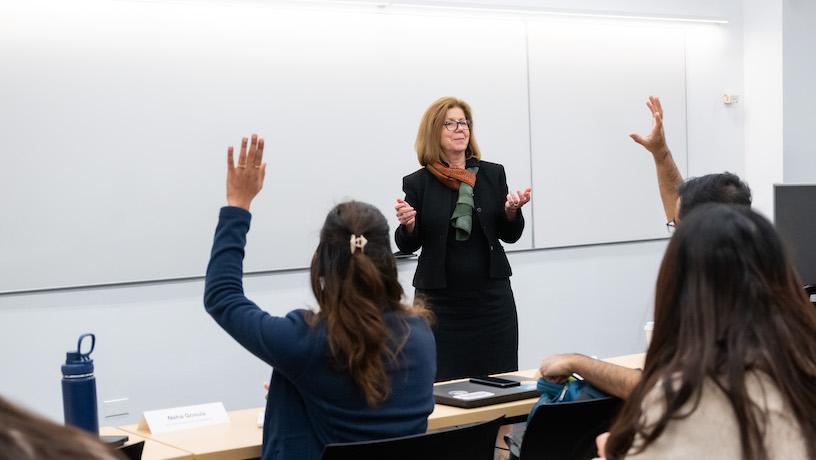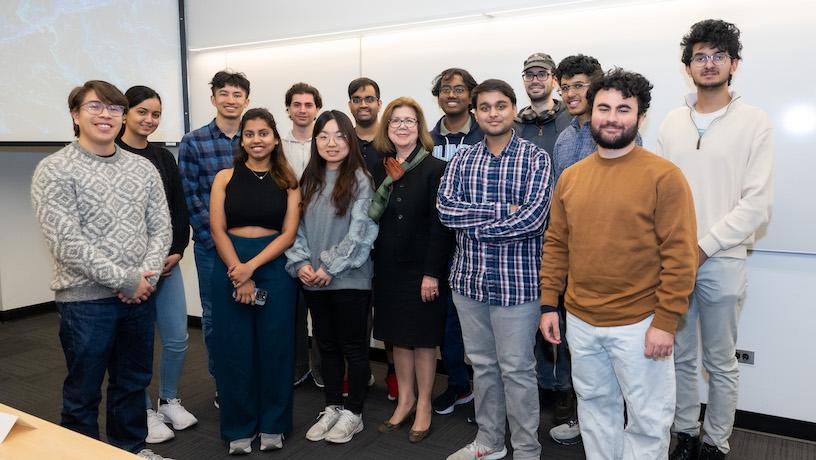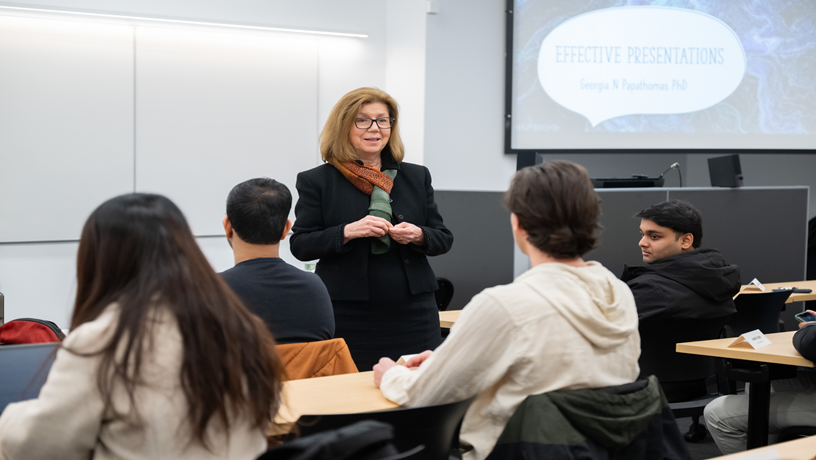Five Questions with Biz-Savvy Alum Georgia Papathomas
A Silberstein Family Executive in Residence, Papathomas shares career insights with future engineers.

Alum and Board of Visitors member, Georgia Papathomas, leads a career workshop for graduate students.
As a seasoned executive who has led IT at biopharma giants like Pfizer and Johnson & Johnson, Georgia Papathomas BS’73, MS’74, PhD’78 will be the first to tell you that the key to a successful career is to never stop learning.
“My career was based on continuous learning, building on the incredible educational foundation I built at Columbia,” said Papathomas, who received three degrees from Columbia Engineering and currently serves on the School’s Board of Visitors. “Columbia not only taught me engineering, but most importantly, it taught me how to think innovatively, achieve collaboratively, and lead with vision.”
This spring, Engineering students had the opportunity to learn from Papathomas and gain firsthand career advice as part of her visit as a Silberstein Family Executive in Residence. During her three-weeks residency this spring, she held sessions on giving presentations and honing interview skills and shared her life and career lessons with students in small group settings. She also met with Engineering faculty members to discuss how to build and strengthen industry partnerships.
Established in 2019 by Alan M. Silberstein BS’69 and his wife, Carol ’69BC, the Executive in Residence program recruits distinguished short-term visitors in fields across industry, business, government, and the nonprofit sector. The program aims to help students expand their understanding of leadership in business and industry and offer ways they can build their skills as leaders early on to make an impact in the world.
Papathomas has more than 35 years of experience in health, life sciences, telecom, and technology, and is an active investor, advisor, and board member with a focus on the health care and technology sectors. She retired from Johnson & Johnson Pharmaceutical in 2018 as the senior vice president and global head of data sciences, and before then, she held leadership roles at Pfizer, Janssen, and Boehringer Ingelheim Pharmaceuticals. She started her career as a researcher at AT&T Bell Labs.
Papathomas continues to lend her time and mentorship to the School and students as an active alum. She also carved out time to talk to us about her start in engineering, her illustrious career, and what she’s learned along the way.

Georgia Papathomas (front, center) pictured with Columbia Engineering graduate students at a Silberstein Family Executive in Residence session held in the spring.
What inspired you to enter the engineering field?
I enrolled in the Department of Civil Engineering and Engineering Mechanics because I wanted to learn how to build bridges. To me, every time I looked at a bridge, I saw a giant piece of art connecting two worlds.
During my graduate studies I became more interested in the fundamentals of engineering, and I was swept away by the new wave of computers and algorithms for solving engineering problems.
Ironically, I never got to build a physical bridge as I set out to do as a young student. Instead, throughout my career I found myself needing to build all kinds of metaphorical bridges: between engineering and business, between employees and management, and between cultures.
How did you make the transition from research to executive management?
After about 10 successful years at AT&T Bell Labs I was placed on a program there that accelerated the career development of participants into senior management positions on the business side.
It was indeed a fast track experience for me-- starting from mergers and acquisitions, to strategy, to business development, to operations, and finally to the “c-suite.”
Every step required additional education and learning. Beyond Columbia Engineering I attended programs at Wharton, Smith College, and Harvard, focusing specifically on the needs of each new role.

What has been the best advice passed on to you early in your career that sticks with you to this day?
My career has been based on continuous learning, building on the incredible education I received at Columbia. I learned to lead with vision and a purpose.
I was advised to dream big and not allow fear or insecurity prevent me from seeing challenge as opportunity.
And, most importantly, to never stop learning.
What was it like for you as a female engineer working in a male-dominated field?
I was lucky to have a loving upbringing in a household that did not entertain the idea of capabilities or different potential between men and women.
When I started my career in the early 1980s, there were very few women in research and even fewer, if any, in management roles. Not having female colleagues felt a bit lonely and, more importantly, there were very few female role models to look up to.
Fortunately, most of the colleagues I worked with and for were supportive of me but I still felt the need to prove myself over and over again.
Of course, there were quite a few times that I had to deal with sexism and biases, both conscious and unconscious, intended and unintentional, subtle and obvious, and each such instance not only made my work and life difficult but also left me more determined to persevere.
It was those difficult times that formed my approach to management. When I became a manager, I became a strong proponent of equity, diversity, and inclusion because I knew that diversity fuels innovation and inclusion improves both personal and business outcomes.
Taking a step back and looking at all that you've accomplished, what has been your biggest career achievement and why?
As a manager my legacy has been my ability to build strong, diverse, and innovative leadership teams working on a common vision, with trust and mutual respect.
Within this environment, not only did we excel, but most importantly we enjoyed our work and we had fun.
As a business person I always aimed to bridge technology capabilities to business needs effectively. One of my major business achievements is establishing data sciences and AI as a key business capability at Johnson & Johnson long before it became the norm across the pharma-industry.
This initiative has not only positioned J&J as a leader in leveraging data for strategic advantages, but has also paved the way for innovation that will benefit patients.
Bonus question: What’s the one key piece of leadership advice you’d like to pass on to future engineers?
As engineers at Columbia you have built a broad base for your journey towards realizing your dreams. But remember, it’s just the beginning.
Don’t limit yourself to predefined paths. Embrace a mindset of continuous learning and resilience. Do not let fear or insecurity deter you from accepting challenging opportunities: they are your path to growth.
So, dare to dream, strive for excellence, and know that remarkable accomplishments are within your reach.
